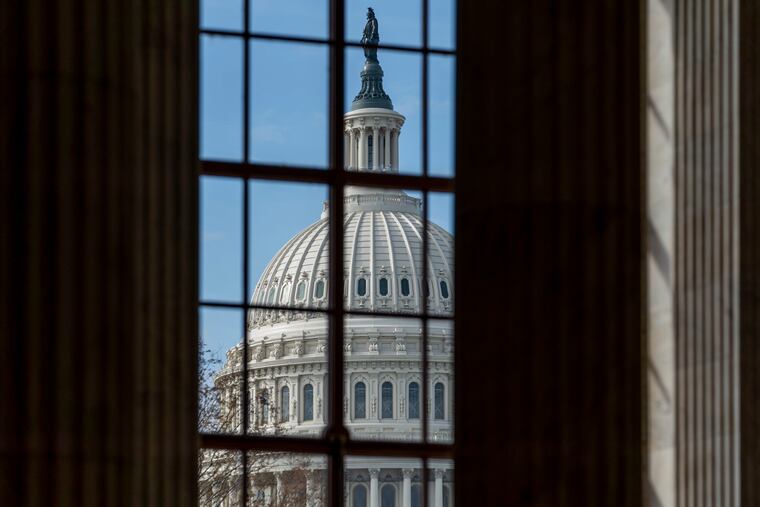Tax change in coronavirus package overwhelmingly benefits millionaires, Congressional body finds
More than 80% of the benefits of a tax change tucked into the coronavirus relief package Congress passed last month will go to those who earn more than $1 million annually, according to a report by a nonpartisan congressional body expected to be released Tuesday.

More than 80% of the benefits of a tax change tucked into the coronavirus relief package Congress passed last month will go to those who earn more than $1 million annually, according to a report by a nonpartisan congressional body expected to be released Tuesday.
The provision, inserted into the legislation by Senate Republicans, temporarily suspends a limitation on how much owners of businesses formed as "pass-through" entities can deduct against their nonbusiness income, such as capital gains, to reduce their tax liability. The limitation was created as part of the 2017 Republican tax law to offset other tax cuts to firms in that legislation.
Suspending the limitation will cost taxpayers about $90 billion in 2020 alone, part of a set of tax changes that will add close to $170 billion to the national deficit over the next 10 years, according to the Joint Committee on Taxation (JCT), the nonpartisan congressional body.
The provision has fueled criticism by congressional Democrats and some tax experts who have called it a giveaway to the wealthy and real estate investors, who frequently face large losses on their investments. Conservatives have said enacting the limitation was a mistake in the 2017 law and suspending it gives badly needed liquidity during the economic downturn caused by the coronavirus pandemic by reducing their tax obligations.
An analysis by the JCT found suspending the limit overwhelmingly benefits higher earners. About 82% of the benefits of the policy go to about 43,000 taxpayers who earn more than $1 million annually. Less than 3% of the benefits go to Americans earning less than $100,000 a year, the analysis found. The analysis included the impact of another tax change in the coronavirus relief legislation that allows firms to write off 100% rather than 80% of their losses, reversing another change in the 2017 tax law.
Hedge-fund investors and owners of real estate businesses are "far and away" the two prime beneficiaries of the change, said Steve Rosenthal, a tax expert at the Tax Policy Center, a nonpartisan think tank.
"It's a scandal for Republicans to loot American taxpayers in the midst of an economic and human tragedy," Sen. Sheldon Whitehouse, D-R.I., who requested the JCT analysis along with Rep. Lloyd Doggett, D-Tex., said in a statement. "Congress should repeal this rotten, un-American giveaway and use the revenue to help workers battling through this crisis."
Michael Zona, a spokesman for Senate Finance Chair Charles E. Grassley, R-Iowa, said in a statement that the coronavirus law "helps businesses keep the lights on and employees on payroll as much as possible to get through this crisis. Every senator criticizing this provision voted for this bipartisan bill, so their complaints about a law they helped write simply stink of partisan politics."
The $2 trillion coronavirus relief package Congress approved last month included hundreds of billions of dollars to increase unemployment insurance benefits, send $1,200 checks to tens of millions of American families, and provide immediate relief to small business nationwide.
It also included more than $500 billion in tax cuts, including a payroll tax holiday for employers and tax incentives for employers who keep workers on the payroll. Republicans used the must-pass legislation to make tax code changes they had sought for years, including returning to policies from the 2017 tax law. All Senate Democrats also voted for the legislation.
Under the 2017 legislation, owners of businesses formed as "pass-through" entities and partnerships could deduct a maximum of $250,000 (or $500,000 in the case of couples) in losses from their "nonbusiness" income. That change came with other measures aimed at lowering the tax obligations for these firms, including new deductions from their federal tax obligations.
But numerous conservative and right-leaning think tanks have said the measure was a mistake that makes it harder for businesses to adjust to years with high losses by preventing how much they can deduct in other years. Kyle Pomerleau, a tax expert at the right-leaning American Enterprise Institute, said the limit was one of the "poorly thought out" provisions in the 2017 law intended to reduce its deficit impact.
Under the coronavirus relief legislation, the limit was suspended, enabling wealthy investors to use millions in losses to reduce their tax burdens. The policy also applies retroactively so losses in 2018 and 2019 can be “carried back” against the past five years.